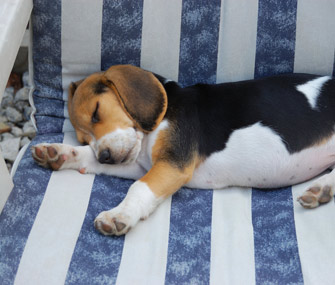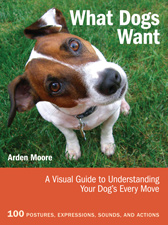Why Does My Dog… Twitch While Sleeping?
by Arden Moore
Published on December 12, 2012
Skip To

Why Your Dog Twitches in His Sleep
Just like us, dogs dream. They go through three sleep stages: NREM, non-rapid eye movement; REM, rapid eye movement; and SWS, short-wave sleep. It is in the SWS stage that a dog breathes heavily while he is sleeping. Animal experts theorize that dogs dream during the REM stage and act on their dreams by twitching or moving all four paws as if they were chasing a rabbit.Dogs who sleep all curled up must keep their muscles tensed and are therefore less relaxed than dogs who stretch out when they sleep and are less likely to twitch in their sleep.
For reasons yet to be explained, young puppies and senior dogs tend to move more in their sleep and to dream more than adult dogs. If you are sleeping close by, these dogs may unintentionally wake you up because of their jerky body movements.
How to Respond
Do not panic when you see your sleeping dog start to twitch. Gently call out his name to wake him. Some dogs can be touchy and reactive while sleeping, so do not use your hand to rouse your dog or you may get bitten. For your safety, honor that adage to “let sleeping dogs lie.”
Dips in temperature can cause cold dogs to twitch while sleeping, in the body’s attempt to stay warm. If you suspect that this is the case, turn up the heat or provide your dog with a blanket.
Know the difference between benign dreamland twitching and a seizure. During sleep twitching, your dog may make a jerky movement or two, but he will fall back to a quiet sleep. If you call his name, he will wake up. During a seizure, your dog’s body is stiff, trembles heavily and may lock up. He can lose consciousness and may pant excessively. He will not respond to his name being called.
More on Vetstreet.com:
* Should Pets Sleep in Your Bed?
* 10 Surprising Things About How Animals Sleep
* Why Does My Dog… Sleep Belly Up?





